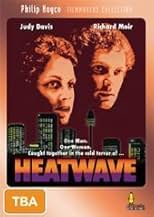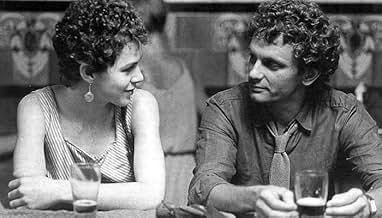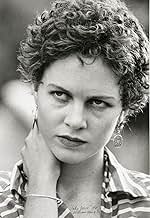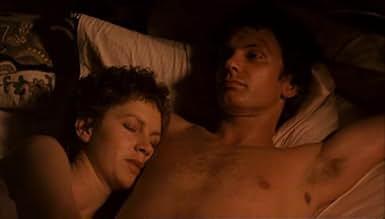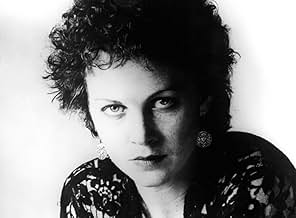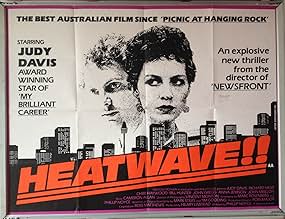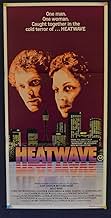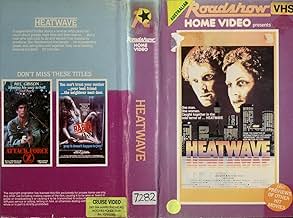La periodista Kate Dean intenta descubrir lo que se esconde tras un proyecto que pretende construir casas en una zona controlada por Stephen West.La periodista Kate Dean intenta descubrir lo que se esconde tras un proyecto que pretende construir casas en una zona controlada por Stephen West.La periodista Kate Dean intenta descubrir lo que se esconde tras un proyecto que pretende construir casas en una zona controlada por Stephen West.
- Dirección
- Guionistas
- Elenco
- Premios
- 1 premio ganado y 3 nominaciones en total
Anna Maria Monticelli
- Victoria West
- (as Anna Jemison)
Opiniones destacadas
This classic Australian film by veteran director Phillip Noyce probably deserves more credit than it gets. It's not as good as Noyce's recent Rabbit-Proof Fence or 1978's Newsfront, but the talent it has to offer is quite impressive with stars such as Judy Davis and Bill Hunter. It won't appeal to everybody, but it's still worth a look at - especially if you're into the Australian film industry.
And subject too. This plot, topic, could be adapted to any country, because the issues, elements it talks about could happen anywhere in a big town. But besides this, I am not that surprised that it was not released in France. As far as I know, Philip Noyce's first film shown in France was DEAD CALM, back in 1989. And this director began his career in 1971 !!! No one in France ever saw those early films in movie theaters. This one is a good drama and character study, relation analysis. I am happy to have discovered it, though it is not really my cup of tea. I guess the Aussie movie industry - and not only Australia - has many more of such gems in its vaults.
I do enjoy this film, but Noyce has made much better ones. The weak drippy story of one courageous woman (who better than Judy Davis to play it) hitting back at wealthy hot shot developers, who want to pull down her residence, amongst a row of other two storey tenements, so they can put up new wave apartments, where underneath some real corruption, and shady characters (prominently Peter Hehir's one) isn't the best story pitch in the world. And too, we are in the midst of a real heatwave, in Sydney, something uncommon in this city today. The story takes place in December, and in Surry Hills or Paddington, if I'm correct as knowing Sydney spots well. Pity. We have a line up of a great cast, who honestly don't have much to work with. Judy Davis, brilliant, who like, Pacino, always has her moments, a particular scene or that, you remember the actor for. She definitely makes her stand here. The day of departure, will be a great falling for the Oz entertainment industry. Moir too, as one of the rivalling major developers, an ace architect, who falls for Davis, is an appreciated talent here, we wish we could of only seen him in more stuff. We too have the fantastic John Meillion, who left us too soon. And how can you not have a film without Chris Haywood, asked as a question or a fact. Him singing road to Gundagai, while promoting an campaign advertisement in the back of a limo, is just a classic frame shot, among many in Australian cinema. And too, the lead up to New Years, with Moir chasing Davis through a sea of people is great, visually, directed by a ace who knows how to capture moments. Not only that, we have a couple of violent scenes, one in particular, the blood looking more like dripped wine. We even see a Sliver star amongst the tenants. With all this going for it, inevitably, it's the story that's failed us, and to add, a stupid and unbelievable confirmation ending. Still this film would have wide appeal, if given a viewing, of favourable appeal from Aussies who have already seen it.
These days, "Heatwave" is a pretty much totally forgotten film, but it's hard to see exactly why that is. Regardless of how the storyline might personally appeal to you, it's an exceedingly well-made and acted film. Judy Davis (in one of her very first roles) creates a very compelling character, a lonely and driven personality that begs you to follow along in her obsession. The setting - a heatwave over the Christmas/New Year season - helps the dramatic sense immensely, though it may be a bit disconcerting to the snowbound North American viewer. Richard Moir is also very good here, an actor who spent most of his career playing invisible roles in invisible movies.
Phillip Noyce went on to do a lot more well-known films, and he's a huge part of what brings it all together. In spite of that, he's goes too far on certain visual manipulation in a film that never really invites it. There's a political edge to the screenplay, which tends to push the viewer away, but a personal side that draws you in. For someone personally engaged in the subject matter, this would be a perfect film. And I liked it a lot.
Phillip Noyce went on to do a lot more well-known films, and he's a huge part of what brings it all together. In spite of that, he's goes too far on certain visual manipulation in a film that never really invites it. There's a political edge to the screenplay, which tends to push the viewer away, but a personal side that draws you in. For someone personally engaged in the subject matter, this would be a perfect film. And I liked it a lot.
Despite this being a dated movie I liked it very much. The Green Bans are something that can be as easily forgotten as remembered. They are not the sort of thing that a memorial can be erected to, but are apart of our history nonetheless and a movie is probably one of the best ways to keep the memory of it alive. The movie does deviate a little from the true events surrounding the struggles between residents and developers, for example the police searched hard for Juanita Nielsen when she whent missing; of which the dissapearance in the film is inspired by, not the slack, apathetic attitude as shown in the film. But then I guess you do have to take a bit of poetic licence, and I guess this was it.
The film certainly had a good guy, bad guy element to it. The struggling squatters led by Kate Dean (played by the talented Judy Davis), against the greedy developer Peter Houseman (Chris Haywood). The cast also contribute to a distinctly Australian movie, along with Davis and Haywood, we have Richard Moir (as the architect of the developers who leans to the squatters) Bill Hunter, John Meillon, and John Gregg. Despite (in my opinion) shonky action movies like the Tom Clancy adaptations, Phillip Noyce has shown he is capable of good movies with the moderately good The Bone Collector, Rabbit Proof Fence (both of which included good music from the ever talented Peter Gabriel) and the Quiet American. This movie is the beginning of that tradition. The last two movies are like this one, historically based, somewhat different from the mainstream features, and intellectual to an extent.
Phillip Noyce, Marc Rosenburg, Judy Davis, and the rest of the cast, ensure that a part of Australain history is remembered through a medium other than a history book (nothing wrong with those though). An Australian movie, inspired by an Australian event, with an Australian director and distinctly Australian cast, make this a distinctly Australian movie. The events that inspired this film and the film itself are both something that we can call our own. A good movie which I am glad I saw.
The film certainly had a good guy, bad guy element to it. The struggling squatters led by Kate Dean (played by the talented Judy Davis), against the greedy developer Peter Houseman (Chris Haywood). The cast also contribute to a distinctly Australian movie, along with Davis and Haywood, we have Richard Moir (as the architect of the developers who leans to the squatters) Bill Hunter, John Meillon, and John Gregg. Despite (in my opinion) shonky action movies like the Tom Clancy adaptations, Phillip Noyce has shown he is capable of good movies with the moderately good The Bone Collector, Rabbit Proof Fence (both of which included good music from the ever talented Peter Gabriel) and the Quiet American. This movie is the beginning of that tradition. The last two movies are like this one, historically based, somewhat different from the mainstream features, and intellectual to an extent.
Phillip Noyce, Marc Rosenburg, Judy Davis, and the rest of the cast, ensure that a part of Australain history is remembered through a medium other than a history book (nothing wrong with those though). An Australian movie, inspired by an Australian event, with an Australian director and distinctly Australian cast, make this a distinctly Australian movie. The events that inspired this film and the film itself are both something that we can call our own. A good movie which I am glad I saw.
¿Sabías que…?
- TriviaThis movie was made and released about seven years after the disappearance and alleged death of Juanita Joan Nielsen (22 April 1937 - est. c. July 4, 1975).
- ConexionesFeatured in Sweating It Out: The Making of Heatwave (2007)
Selecciones populares
Inicia sesión para calificar y agrega a la lista de videos para obtener recomendaciones personalizadas
Detalles
- Fecha de lanzamiento
- País de origen
- Sitio oficial
- Idioma
- También se conoce como
- Heat Wave
- Locaciones de filmación
- Productoras
- Ver más créditos de la compañía en IMDbPro
- Tiempo de ejecución1 hora 31 minutos
- Mezcla de sonido
- Relación de aspecto
- 1.85 : 1
Contribuir a esta página
Sugiere una edición o agrega el contenido que falta

Principales brechas de datos
By what name was Heatwave (1982) officially released in Canada in English?
Responda
